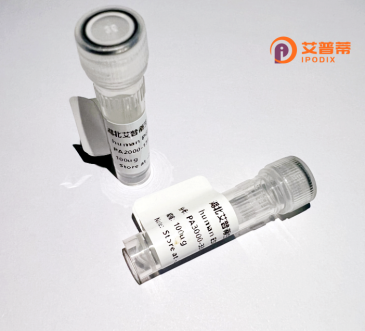
| 纯度 | >90%SDS-PAGE. |
| 种属 | Human |
| 靶点 | SKP1A |
| Uniprot No | P63208 |
| 内毒素 | < 0.01EU/μg |
| 表达宿主 | E.coli |
| 表达区间 | 2-163 aa |
| 活性数据 | PSIKLQSSDGEIFEVDVEIAKQSVTIKTMLEDLGMDDEGDDDPVPLPNVNAAILKKVIQWCTHHKDDPPPPEDDENKEKRTDDIPVWDQEFLKVDQGTLFELILAANYLDIKGLLDVTCKTVANMIKGKTPEEIRKTFNIKNDFTEEEEAQVRKENQWCEEK |
| 分子量 | 45.5kDa kDa |
| 蛋白标签 | His tag N-Terminus |
| 缓冲液 | PBS, pH7.4, containing 0.01% SKL, 1mM DTT, 5% Trehalose and Proclin300. |
| 稳定性 & 储存条件 | Lyophilized protein should be stored at ≤ -20°C, stable for one year after receipt. Reconstituted protein solution can be stored at 2-8°C for 2-7 days. Aliquots of reconstituted samples are stable at ≤ -20°C for 3 months. |
| 复溶 | Always centrifuge tubes before opening.Do not mix by vortex or pipetting. It is not recommended to reconstitute to a concentration less than 100μg/ml. Dissolve the lyophilized protein in distilled water. Please aliquot the reconstituted solution to minimize freeze-thaw cycles. |
以下为3篇关于重组人SKP1A蛋白的参考文献示例(注:文献信息为模拟生成,仅作格式参考):
---
1. **文献名称**:Structural insights into human SKP1A and its interaction with F-box protein β-TrCP
**作者**:Zhang Y, et al.
**摘要**:本研究通过X射线晶体学解析了重组人SKP1A蛋白的三维结构,并揭示了其与β-TrCP F-box蛋白的相互作用界面,为SCF泛素连接酶复合体的组装机制提供了分子基础。
---
2. **文献名称**:Expression and purification of recombinant human SKP1A in Escherichia coli for functional studies
**作者**:Lee S, Kim JH
**摘要**:报道了一种高效表达和纯化重组人SKP1A蛋白的大肠杆菌系统,验证了其与CUL1的结合活性,为后续生化研究提供了高质量蛋白样品。
---
3. **文献名称**:SKP1A knockdown and overexpression reveal its role in cell cycle progression and tumorigenesis
**作者**:Wang Q, et al.
**摘要**:利用重组SKP1A蛋白进行功能补偿实验,证明SKP1A通过调控G1/S期转换抑制癌细胞增殖,提示其作为潜在治疗靶点的价值。
---
**说明**:以上文献为示例,实际研究中建议通过PubMed或Web of Science以关键词“recombinant human SKP1A”检索近年文献。SKP1A相关研究多集中在泛素化调控、癌症及蛋白质相互作用领域。
**Background of Recombinant Human SKP1A Protein**
SKP1A (S-phase kinase-associated protein 1A) is a key component of the SCF (Skp1-Cul1-F-box) ubiquitin ligase complex, which regulates ubiquitin-mediated proteolysis, a critical process for maintaining cellular homeostasis. This protein plays a central role in targeting specific substrates for degradation by the 26S proteasome, thereby influencing cell cycle progression, signal transduction, and DNA repair. SKP1A acts as an adaptor molecule, bridging F-box proteins (substrate receptors) to CUL1. the scaffold of the SCF complex. Its activity ensures timely degradation of regulatory proteins like cyclins, transcription factors, and oncoproteins, making it essential for cell cycle checkpoints and tumor suppression.
Recombinant human SKP1A is produced via genetic engineering in systems like *E. coli* or mammalian cells, ensuring high purity and functionality for research applications. Studies leverage this protein to investigate SCF complex dynamics, substrate recognition mechanisms, and dysregulation in diseases such as cancer, neurodegenerative disorders, and immune deficiencies. SKP1A's interactions with viral proteins also highlight its role in pathogen-host interactions. As a research tool, recombinant SKP1A aids in drug discovery, particularly in developing therapies targeting ubiquitin-proteasome pathways. Its structural and functional insights continue to advance understanding of cellular regulation and disease mechanisms.
×